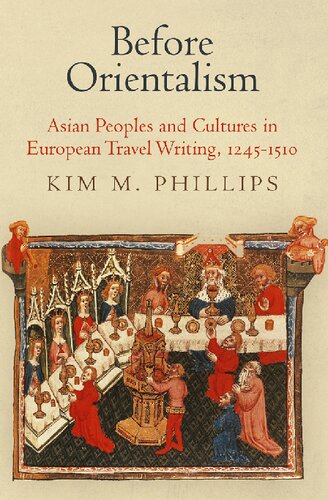

Most ebook files are in PDF format, so you can easily read them using various software such as Foxit Reader or directly on the Google Chrome browser.
Some ebook files are released by publishers in other formats such as .awz, .mobi, .epub, .fb2, etc. You may need to install specific software to read these formats on mobile/PC, such as Calibre.
Please read the tutorial at this link: https://ebookbell.com/faq
We offer FREE conversion to the popular formats you request; however, this may take some time. Therefore, right after payment, please email us, and we will try to provide the service as quickly as possible.
For some exceptional file formats or broken links (if any), please refrain from opening any disputes. Instead, email us first, and we will try to assist within a maximum of 6 hours.
EbookBell Team

4.3
78 reviewsA distinct European perspective on Asia emerged in the late Middle Ages. Early reports of a homogeneous "India" of marvels and monsters gave way to accounts written by medieval travelers that indulged readers' curiosity about far-flung landscapes and cultures without exhibiting the attitudes evident in the later writings of aspiring imperialists. Mining the accounts of more than twenty Europeans who made—or claimed to have made—journeys to Mongolia, China, India, Sri Lanka, and Southeast Asia between the mid-thirteenth and early sixteenth centuries, Kim Phillips reconstructs a medieval European vision of Asia that was by turns critical, neutral, and admiring.
In offering a cultural history of the encounter between medieval Latin Christians and the distant East, Before Orientalism reveals how Europeans' prevailing preoccupations with food and eating habits, gender roles, sexualities, civility, and the foreign body helped shape their perceptions of Asian peoples and societies. Phillips gives particular attention to the texts' known or likely audiences, the cultural settings within which they found a foothold, and the broader impact of their descriptions, while also considering the motivations of their writers. She reveals in rich detail responses from European travelers that ranged from pragmatism to wonder. Fear of military might, admiration for high standards of civic life and court culture, and even delight in foreign magnificence rarely assumed the kind of secular Eurocentric superiority that would later characterize Orientalism. Placing medieval writing on the East in the context of an emergent "Europe" whose explorers sought to learn more than to rule, Before Orientalism complicates our understanding of medieval attitudes toward the foreign.